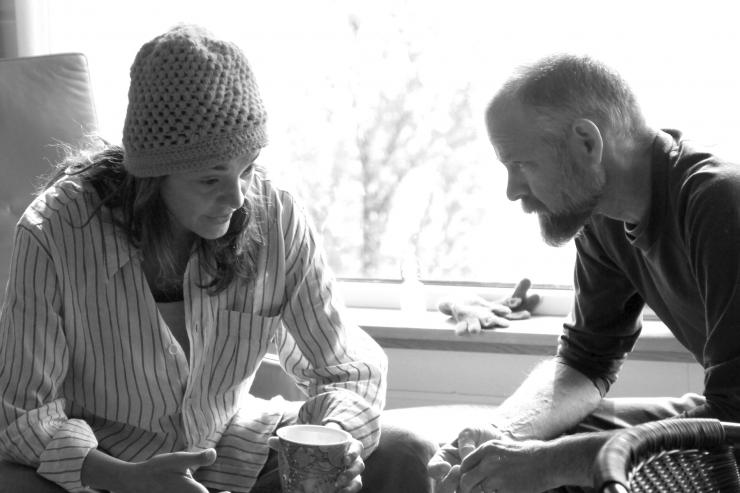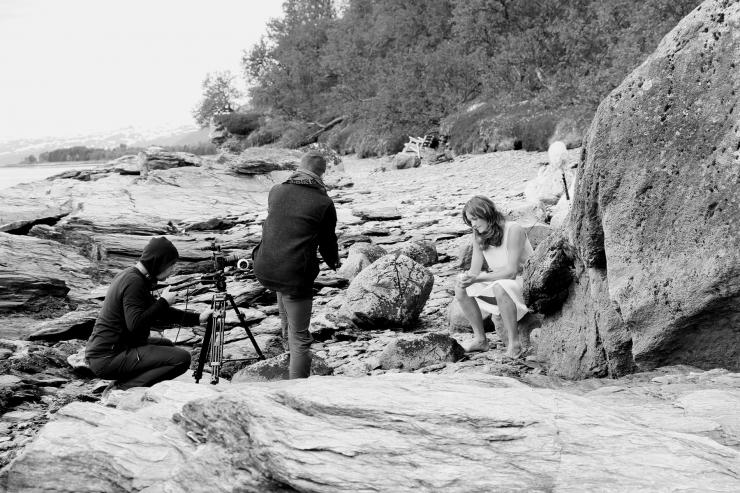I am not sure if I have ever known where a play finds a beginning, which is to say I don’t know the exact place or point where a play takes hold of me and needs to be written. Sometimes I begin to hear conversations, and I become interested in what’s being said. Then I’ll listen a little closer or a little longer, and I’ll want to know what questions are being asked. I need to believe that people are asking themselves questions all the time. A playwright seems to have the good fortune of a musician in that he can listen to what’s being played more than he can sense his own playing. Knowing how to listen may be the best sort of practice a playwright can gain.
I have a tendency to hear characters individually. I also hear them alone. I don’t know why this is, though I wonder if most of us simply try to make sense of things for ourselves. That process certainly doesn’t exclude other people. Other people become an intimate part, maybe the intimate part of how and what we understand of our lives. But I like to sit with a single character, and I want to listen to her. Without ever fully knowing a character, I want to appreciate as much as I can about her effort to comprehend her world, or her demand to realize something more of it.
A single character will carry the voice and images of others she has loved, watched, ignored, despised, sat with, laughed at, cried over, and all other possible experiences we ourselves might share with another person. There is a closeness we can gain through a single character, a closeness that hopefully isn’t cheapened into a sort of voyeurism. Instead, we are privileged to witness that character’s most intense moments of recollection and comprehension, or even their absence.
I am the sort of person who prefers to see someone with a glance through a window rather than step into a home. Or perhaps I should describe my tendency this way. I ride a commuter bus nearly every day, and nearly every day I see someone who makes me wonder about their experience and what they are thinking. Consider a middle age man with a handsome leather briefcase and a sack of groceries. He has no computer with him, no phone. He looks constantly out of the bus window. Who or what is he seeing? Is he anxious to reach his destination, or to return wherever he has come from? Either direction would beg other questions.
It feels like a pure kind of moment when I first hear someone telling their story, even when I know what they are telling me is a lie. I don’t know how long such moments can last, but usually they are short, and someplace in them is where a play begins.
The other day I was walking close to home when I saw a girl—a teenager—who tried to hide her face against a car window. The car was moving at a regular speed for where I live, but I could see enough. I could see the girl was crying and that she was using her left hand to keep her crying a secret. I assume the man driving the car was her father. He didn’t look upset. He didn’t look threatening. She was a teenage girl, riding in a car with her father, trying to hide her tears. I am not without sympathies, but I confess I’m not particularly interested in the facts of that moment, nor is there anything I wish to invent. Rather, I desire to hear whatever story the girl is telling herself.
It feels like a pure kind of moment when I first hear someone telling their story, even when I know what they are telling me is a lie. I don’t know how long such moments can last, but usually they are short, and someplace in them is where a play begins. If I listen to such a moment and decide to write a play, then the necessary developments will come. There will be a structure to discover, a focus, a better sense of who or what matters to certain characters, or to just one character. There will be changes. But I try to stay as long as I can in that initial moment of listening. I sometimes catch myself leaning in the direction of whoever is speaking, whether that’s a character beside me or in my head. If I have heard her well enough and conveyed well what she has said, then those of us watching or listening may see her as she is and as she is without us. Then we might share a collective glance through a window. Then we might also be ourselves.

Source: http://howlround.com/on-listening-finding-characters-in-their-element
